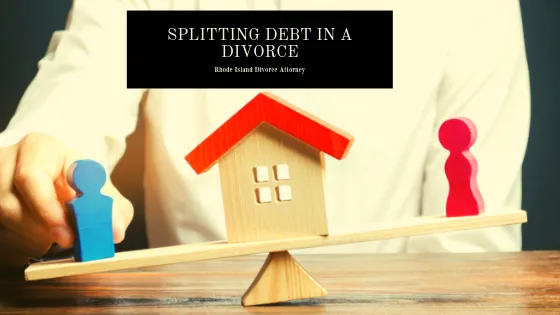
If debt wasn’t an issue for you or your spouse in a divorce, consider yourself quite lucky. The simple truth is that most Americans are in some form of debt. It’s incredibly common for two people to enter and subsequently exit a marriage with large sums of debt. Whether it be student loan debt, credit card debt, or mortgage debt, who has to foot the bill after a divorce? Are you required to pay for your ex-spouse’s bad financial decisions? Is your ex responsible for your debt? In this article, we explore how debt in a divorce is split and how a Rhode Island divorce lawyer can help you through this process.
Rhode Island is an Equitable Division State
When a divorce is pending, most people will worry about the separation of assets. But it’s also important to be concerned about how your debt in a divorce will be divided as well. The first thing you need to know is that Rhode Island is an equitable division state. This differs from a community property state where everything is basically split down the middle after a divorce. An equitable division state handles divorce in a different way. Unfortunately, sometimes equitable division can be more complicated. A Rhode Island divorce lawyer can further explain how equitable division states work when it comes to splitting debt in a divorce.
Distinguishing Between Marital Debt or Pre-marital Debt
Since Rhode Island is an equitable division state, any debt that accrued before the marriage will only belong to that one spouse. This is often referred to as pre-marital debt or separate property/debt. However, if both spouses co-signed on a lease or accrued the debt together, it’s considered marital debt. This will be split in a way that the Rhode Island courts see as fair. Going through the process of determining what debt was collected by whom and when is important. When you and your ex-spouse identify all of the assets and debt that you’ve collected together, it’s highly recommended to decide how to divide this before the divorce or through mediation.
Splitting Debt in a Divorce: A Few Examples
Credit Card Debt
It’s likely that you won’t be responsible to pay your ex-spouse’s credit card debt if it’s not held in your name. This is especially true if the credit card was in their name before the marriage and remained in their name after the divorce. Of course, joint credit card debt is another story. Both parties will likely be responsible in some way of shared credit card debt in a divorce. Regardless if you were or were not the person making the payment. If your name was on the account and you used the card, it will be considered marital debt.
Student Loan Debt
If two people have an even amount of student loan debt, it can be fairly easy to divide up the debt in a divorce. But much like credit card debt, it’s important to know if the student loans were taken out before the marriage. If you incurred student loan debt before getting married, it’s likely that it will be considered your responsibility after a marriage has ended. If you took out student loans during the marriage, that can be different. Equitable division states can slice up debt in a divorce in a variety of ways. For instance, a judge might look at who was making the student loan payments, what’s the earning wage of each spouse, or if the borrower earned a degree during the marriage.
Mortgage Debt
A Rhode Island divorce lawyer might suggest a few different options for couples separating mortgage debt. A desirable option is to sell the property and divide the earnings or debt equally. Or, you may want to offer to buy out your ex, or visa versa. Since a mortgage involves a living situation, this kind of debt can be difficult to manage. The best way to do that is to decide who wants to live where and if you’re both willing to keep or sell the property. If you want to remain in the home, then you can explore different options that allow you to do that. The important point to remember is that it’s not automatically split 50/50 in the state of Rhode Island.
For More Information on Splitting Debt in a Divorce
As mentioned above, since Rhode Island is an equitable division state, division of debt and assets can become complicated. It’s highly recommended for divorcing couples to work with an experienced Rhode Island divorce lawyer if they have an excess of debt or assets. A divorce lawyer can help you decide what debt belongs to whom and how it should be divided. Contact a Rhode Island divorce lawyer today for more information on splitting debt in a divorce.




